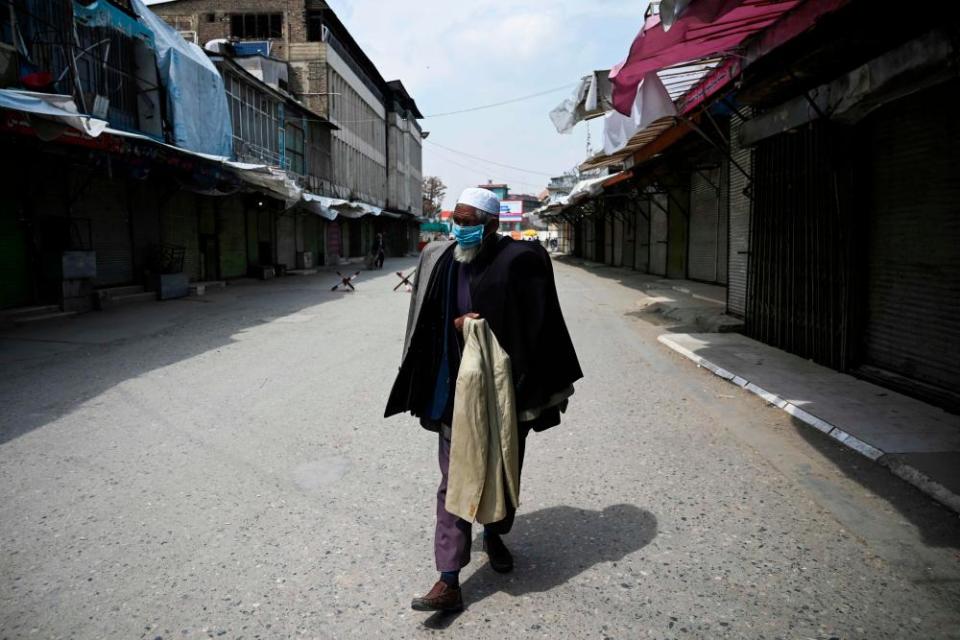'No profit, no food': lockdown in Kabul prompts hunger fears
The streets of Afghanistan’s capital, Kabul, were packed on Friday; a hectic bustling in the markets and shops, pious whispers ringing from prayer gatherings at the mosques, the skies full of kites that children were flying.
But on Saturday the city of around six million people went into lockdown to stop the spread of coronavirus in one of the poorest and most war-torn countries in the world.
Many residents defied the order. Beneath billboards warning of the dangers of the virus, casual labourers, shoeshiners and vendors kept on working until an increased police crackdown saw parts of the city become quieter.
The announcement to shut down Kabul came as public health minister Ferozuddin Feroz decried people’s carelessness. “If we don’t take the coronavirus seriously, it will take us seriously,” Feroz said, adding that this was why the country needed to “apply these health guidelines”.
By Tuesday the city was almost silent but the skies were still filled with colour as children took to the roofs to fly their kites. At least 174 people had tested positive for the virus and four were known to have died, but with limited testing – so far available only in Kabul and the north-western city of Herat - the numbers are unreliable.

Feroz said: “Estimates show that more than 25 million people could become infected in Afghanistan, with at least 16 million showing symptoms. The spread can be prevented if measures are implemented.”
While the lockdown is necessary, many fear it could leave people struggling even harder to survive in the impoverished, war-torn country.
Said Tamim, 56, who owns a small shop in central Kabul selling everything from toiletries and chewing gum to kites and plastic containers, says closing his business essentially means no dinner for his family of six. For now, he explained, he would try to keep his business up and running, lockdown or not.
“If I don’t make a profit, I won’t be able to pay rent or even buy food. Our livelihood depends on the shop being open every day,” said Tamim. He hoped his wife, who works as a tailor, could possibly work from home to support the family if the shop had to close.
Tamim’s worries are shared across the city, where tens of thousands of daily labourers fear for their existence. Many already feel burdened by the responsibility of making sure their families have enough to eat. At least 60,000 children work in Kabul alone to substitute family incomes, according to Unicef.
The 21-day lockdown, which could be extended depending on the situation, might see many drift into further poverty, hunger and homelessness.
In a further effort to curb infections, the government has announced the release of thousands of prisoners from its crammed prisons. But with unemployment soaring and businesses closed, many fear a spike in violent crimes and burglaries.
Kabul’s governor Mohammad Yaqub Heidari has ordered conference and wedding halls to be turned into isolation shelters for Afghans arriving from abroad. Food prices have already soared, though government and religious leaders are calling on shopkeepers to not take advantage of the situation.
Afghanistan has seen four decades of war, but the hardest times lie ahead, said Abdul Qayum Rahimi, governor of Herat province.
“Afghanistan wasn’t ready to face a challenge like this,” he said. “Even fighting the Taliban is different. You can see them and you know their weapons. The coronavirus needs a microscope, of which we don’t have many.”

Afghanistan’s healthcare system is severely overstretched and – prior to the pandemic – had only allocated about $5 (£4) annually for each of its 35 million citizens.
Newly announced US aid cuts of $1bn have applied further pressure. The US secretary of state Mike Pompeo announced the cuts after a short visit to Kabul which did nothing to resolve the dispute between President Ashraf Ghani, whose re-election was confirmed after a five-month delay, and his bitter rival Abdullah Abdullah, who has also claimed the presidency.
Rahimi, who has described the pandemic as “the most stressful time” of his life, said that “this isn’t the time for politicians to fight, but to come together and lead Afghanistan to progress”.
On Friday evening, just hours before the lockdown took effect at midnight, Afghans in several parts of Kabul went on to their roofs, chanting “God is great.”
“The fear sits deep,” Said Tamim admitted. “We’re afraid to get sick and we’re afraid to become hungry. I don’t know how we will survive.”

